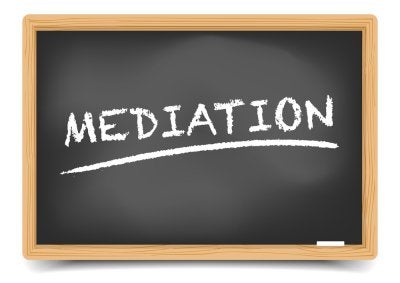-
Separate Revocable Trusts

When you have children and have been through a divorce, it’s natural to be apprehensive about your kids’ future if you decide to marry again. A second marriage often requires much more planning than just a wedding when children are involved. This is especially true if you have assets you want to pass along to your children when you pass away.
If you were to pass away first and didn’t implement a plan, your children could unintentionally get disinherited. A trust may be a solution to ensure your share goes to your children from your first marriage.
What is a Revocable Living Trust?
A living trust, also called a revocable trust, is an account that holds the assets and funds you place in it throughout your lifetime. You can put your home, car, and other assets in the trust’s name.
While alive, you can add, remove or make changes to the trust as often as you like. Once you pass away, the trust becomes irrevocable, and no changes can be made. The designated trustee will then distribute the trust assets and funds per your instructions.
Should We Create a Joint Trust or Separate Revocable Trust?
If you and your second spouse want everything equal, a joint trust may be the right option. But if you want your children to receive your assets or you and your spouse have different ideas for allocation, two separate trusts are advisable. It’s also the best solution if you plan to keep your finances separate. If you have assets and property separately going into the marriage, you may wish to keep them in your family.
There are other benefits to having separate spouse trusts. If your spouse is in financial trouble and has creditors coming after them, having a separate trust can shield your assets from creditor access. In a joint trust, everything is up for grabs to pay for a debt if a creditor comes knocking.
Suppose you or your spouse expect to receive an individual inheritance you’d like to keep separate. In that case, a separate trust is the best choice. A joint trust makes the inheritance equally available to your spouse.
Perhaps the most practical reason to create a separate trust is for tax savings. Maryland has an estate and inheritance tax, often referred to as a death tax. Your heirs may have to pay estate and inheritance tax if your net worth exceeds Maryland’s exemption amount. However, separate spousal trusts allow you to double the tax exemption amount, which could reduce or even eliminate the amount of taxes they owe.
Ready to Set Up Your Separate Spouse Trusts?
Having children from a prior marriage can make finances tricky. If you think two separate spouse trusts are the way to go, are leaning towards a joint trust, or aren’t sure which is the best choice for your situation, contact Mummert Law to schedule a consultation. We can help you figure out which trust solution is best for your family and set them up correctly so there’s no chance of a dispute later.
-
Tips for Talking to Your Family About Advanced Medical Directives
It may not be pleasant to think about what might happen to you if you become incapable of expressing your care preferences , but it is necessary to prevent interpersonal conflicts among family members. The document in which you can specify your healthcare preferences is called an advanced medical directive or a living will. Consider talking to an estate planning attorney in Baltimore about creating your advanced medical directive before speaking with your family about it.
When you are ready to discuss your living will with your family, watch this interview with a physician to get some helpful tips. He recommends that you first reassure your loved ones that you are not seriously ill, depressed, or otherwise experiencing trouble. This physician also discusses what adult children might consider when broaching this subject with their aging parents and he explains the types of decisions that a living will can encompass.
-
What Is Probate?
Legal matters are often complex and confusing in the wake of a loved one’s death. It’s highly recommended that you consult an estate lawyer in Baltimore to guide you through the probate process. Probate is the process by which a will is legally recognized, an executor or personal representative is appointed, and the assets are distributed. In some cases, probate can be completed relatively easily and quickly. In other cases, such as when a will is contested, the matter can drag on for months.
After a person dies, a probate lawyer will ask that the court legally recognize the will and appoint the executor that the decedent named. If the person died without a will, then the judge can appoint someone. The executor is responsible for taking an inventory of the decedent’s assets and debts, and for identifying the beneficiaries. The executor will need to settle the decedent’s outstanding debts before distributing the remaining assets to the beneficiaries in the manner specified in the will.

-
A Step-by-Step Guide to the Adoption Process in Maryland
Making the decision to adopt a child is a joyous occasion, but the process itself can often be tedious and confusing. If you intend to adopt a child, you can make an appointment with a lawyer in Baltimore who handles adoption cases. Your lawyer can walk you through the stages of the adoption process and provide legal representation if any problems arise.

Requirements
The requirements to adopt a child in Maryland are not unnecessarily strict. However, an adoptive parent must be at least 21 years of age. Adoptive parents may be single or married. If married, then both adoptive parents will be joined to the petition unless the couple is separated or the other parent is not legally competent. It is not necessary for adoptive parents to be affluent; however, they must have the financial means to provide for the child. Adoptive parents may be renters or homeowners. It is required to complete a 27-hour home study course before adopting a child through a public agency.
Consent
Under Maryland family law, the legal guardians of the adoptee must provide consent for the adoption. The legal guardians may be the birth parents or the adoption agency. If the court has terminated parental rights, then only agency consent is required. If the adoption is an independent adoption, the adoptive parents must obtain the consent of all legal guardians. However, the consent of only one parent may be needed if the other parent cannot be located, does not object to a published notice of adoption, and has not been in contact with the department for a certain length of time.
Petition
A lawyer will file a petition for adoption with the court, which will likely include supporting documents. Once the petition is filed, the court will send a notice to all of the involved parties and their attorneys.
Hearing
During the hearing, the judge will decide whether to grant or deny the petition for adoption. If it is an independent adoption, the court might require an investigation prior to granting the petition. If the matter is being facilitated by a private adoption agency, then the agency will need to submit a report prior to the hearing. During the hearing, the judge will consider whether the petitioners are fit to be adoptive parents, whether all necessary paperwork has been completed, and whether being adopted is in the best interests of the adoptee.
-
Finding Your Birth Parents
Individuals who were adopted often have many questions about their birth parents . It isn’t always possible to uncover the identities of the birth parents, especially if it was a closed adoption. However, the first step is to consult a lawyer in Baltimore. A lawyer can guide you through the process of filing consent for contact and a waiver of confidentiality with the Department of Social Services. If your birth parents have also filed this paperwork, then the identities can be disclosed. In many cases, however, mutual consent is not given.
Watch this video to find out what you can do if the adoption was closed and mutual consent is not given. This professional explains that you can have a lawyer petition the court to open the records. In the petition, you must provide compelling reasons why the court should open the records. For example, you may need information about your birth parents for medical reasons.
-
The Rights of Noncustodial Parents
Noncustodial parents do not have physical custody of a child, but are often granted visitation rights and still maintain certain responsibilities, such as providing child support. When custodial and noncustodial parents disagree, it’s important to understand your rights as a noncustodial parent and how they affect your stance during visitation, custody, or child support mediation in Baltimore.
In this video, you will learn more about the rights of noncustodial parents. If you are meeting resistance from the custodial parent when you attempt to co-parent your child, an attorney specializing in family law can help. Filing a petition in court or seeking mediation will ensure that your rights regarding visitation, phone calls, and access to your child’s records are upheld.
-
Common Questions About Adoption Mediation
Mediation is an invaluable tool for resolving many different types of disputes, including disputes that involve adoption. Adoption mediation can help adoptive parents and birth parents reach mutually agreeable arrangements that allow them to avoid prolonged and contentious court battles. A mediation lawyer in Baltimore can assist your family in all types of circumstances, including independent adoptions, in-state and out-of-state adoptions, contested adoptions, and many others.

What is a post-adoption communication agreement?
One of the most common problems that adoptive parents encounter is post-adoption contact. An adoption could be proceeding smoothly when one or both of the birth parents abruptly demands ongoing contact with the child after the adoption. Adoptive parents should not feel pressured to immediately agree to the demands of the birth parents. Instead, they can turn to adoption mediation to resolve the conflict by producing a mutually agreeable post-adoption communication agreement. This is a written agreement that is signed by both sets of parents. The purpose of the agreement is to serve the best interests of the child. The agreement outlines the specific contact that will be allowed, including the type of contact (e.g. phone calls, visits, or letters) and the frequency of contact. If visits will be allowed, the agreement should specify the location of the visit and how long it will last. Post-adoption communication agreements, much like child visitation orders, can also make arrangements for dealing with special occasions like birthdays and holidays.
What is a contested adoption?
A contested adoption occurs when a birth parent agrees to place the child for adoption and the other birth parent objects to the adoption. Typically, the birth mother initiates adoption proceedings and the birth father later objects to them. Usually, the law grants preference to birth parents when assessing parental rights. However, adoption mediation can still be useful in contested adoption. In some cases, the objecting birth parent may decide to allow the adoption to proceed if he or she will be granted post-adoption contact.
How can adoptive parents prepare for adoption mediation?
The best way to prepare for adoption mediation is to consult the mediation lawyer. Learn what to expect from a typical mediation session, understand the goals and limitations of mediation, and consider adjusting your mindset. To reach a compromise that is in the child’s best interests, it may be necessary to be open-minded toward the needs of the other set of parents.
-
What Is a Children’s Trust?
A children’s trust can be a useful estate planning tool for families with small children. It allows parents to leave assets to children while controlling the age at which they have access to them. Your estate lawyer in Baltimore can help you decide if this kind of trust could be right for you.
With a children’s trust, benefactors assign assets to a trust for a child and identify a trustee to control the assets until the child reaches an age set by the benefactor. For instance, while estate planning, parents may decide to set up a trust for their toddler and name a close relative as the trustee. The trust says that the child cannot control the inheritance until they reach age 18. If both parents are deceased before the child reaches 18, he or she receives the trust but the trustee manages it as directed by the parents. If both parents are deceased after the child reaches 19, he or she receives the inheritance without the involvement of the trustee.
Children’s trusts put many parents’ minds at ease while estate planning. Your estate lawyer can guide you through the process of establishing your trust.

-
Common Reasons for Post-Divorce Mediation
Mediation can be a useful tool during divorce to settle issues with as little acrimony as possible. Whether or not mediation was part of your initial divorce, it can also be helpful in solving new issues as they arise after the divorce. Post-divorce mediation in Baltimore allows former spouses to address unforeseen circumstances without reopening old wounds and going into the process as adversaries, since mediation is focused on building agreements that are acceptable for everyone. Here are some of the many reasons people attend post-divorce mediation.

Child Support Modification
There are numerous reasons why a child support agreement may need to be modified, from job loss to increased income. When a circumstance arises that causes one parent to reopen the discussion about child support, mediation allows him or her to do so without the contentious nature of court. A mediator can help both sides lay out their opinions and work with them to build a new agreement that satisfies both sides.
Child Custody Modification
Child custody is almost always a difficult issue during divorces, and sometimes, after the final decree is issued, parents find that the agreement isn’t working. Perhaps the children want to split up their time differently or one parent feels like he or she needs more time with the children. In some cases, parents need to adjust child custody and visitation schedules because of relocations or changes in working hours. Rather than arguing over the issue in court, mediation lets parents work together on the same side to give and take on an agreement that meets both of their needs.
Alimony Modification
Sometimes, the circumstances that were in place during the original alimony ruling may change, forcing the need to modify the agreement. For instance, the spouse paying alimony may lose his or her job, changing his or her ability to pay, or a spouse receiving rehabilitative alimony may finish school early and land a lucrative job. Mediation gives both parties a place to discuss their concerns openly and collaboratively in order to come up with a solution.
-
A Look at the Stepparent Adoption Process
When you form a new family through divorce and remarriage, your child’s remaining biological parent typically retains some measure of legal guardianship over your children. If your new spouse wishes to become a legal guardian for your child, you must complete a stepparent adoption to terminate the rights of your divorced partner so these rights can be transferred to your new spouse. Stepparent adoption may or may not proceed smoothly, depending on the opinions of the child’s biological parents; thus, it is always beneficial to seek the guidance of a family law attorney in Baltimore to guide you through the stepparent adoption process, especially if you anticipate a dispute that may require adoption mediation or a court investigation.

Seeking Parental Consent
To pursue a stepparent adoption in Maryland , the consent of both biological parents must be obtained. Thus, the first step in the stepparent adoption process is contacting the child’s additional biological parent regarding the adoption. If consent is given, the adoption may proceed unhindered. However, if the biological parent does not consent to the adoption, further steps must be taken if you still wish to pursue stepparent adoption.
Handling a Parental Objection
When a biological or legal guardian refuses to relinquish their guardianship rights, they may file an objection to the adoption process. Alternatively, the biological parent may simply fail to provide legal consent. When an objection is filed or consent is not given, the couple wishing to pursue stepparent adoption may seek a court investigation to show that stepparent adoption is in the best interests of the child. If the legal parent is determined to have been absent or neglectful with regard to his parenting responsibilities, his rights may be terminated and the stepparent adoption allowed to proceed. Alternatively, if the contesting parent does not meet the legal definition of a presumed father, his rights may also be terminated to allow for stepparent adoption.
Even if you expect a stepparent adoption to go smoothly, a family law attorney is your best resource for guidance and support during this process to reduce stress for you, your spouse, and your child.

